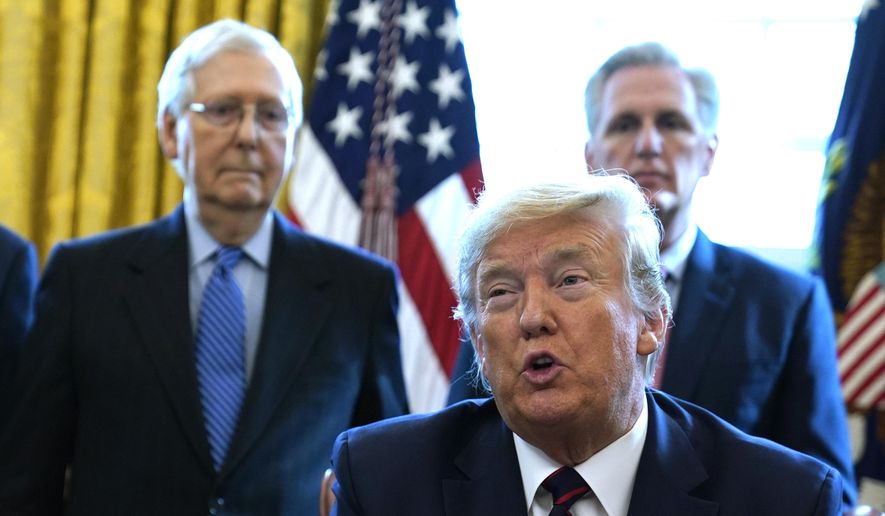WASHINGTON (AP) - As governors plead for aid, Republican leaders in Congress said Saturday they prefer replenishing a $350 billion small business program rather than negotiate the broader coronavirus package Democrats are pushing with the White House.
In a joint statement, Senate Majority Leader Mitch McConnell and House Minority Leader Kevin McCarthy said they will seek “clean” funding for the Payroll Protection Program without tacking on $250 billion for health care providers or cash-strapped states as Democrats want.
“American workers are in crisis,” they wrote.
The Republicans said they “reject Democrats’ reckless threat to continue blocking job-saving funding unless we renegotiate unrelated programs which are not in similar peril.”
The Trump administration has requested $250 billion more for the program, which gives forgivable loans of up to $10 million to small businesses to make payroll during the crisis. Both parties support the program, but Democrats want to add new safeguards. They also want another $250 billion for hospitals and states.
The nation’s governors on Saturday urged Congress to send $500 billion “to meet the states’ budgetary shortfalls that have resulted from this unprecedented public health crisis.”
Republican Gov. Larry Hogan of Maryland and Democratic Gov. Andrew Cuomo of New York said without federal intervention, states will be forced to confront “serious reductions in service … hampering public health, the economic recovery, and - in turn - our collective effort to get people back to work.”
Congress is racing to craft the new rescue package as health care providers work around the clock to care for coronavirus patients and the nation’s jobless rate hit a staggering 16 million during the economic shutdown.
The GOP leaders’ stance hits the brakes on movement toward bipartisan negotiations that were poised to begin as soon as next week to fund both the payroll program and the other accounts.
Democrats said the Trump administration was ready to open bipartisan talks as it became clear none of the separate proposals would be approved on their own in Congress after failed Senate votes on Thursday.
Top Senate Democrat Chuck Schumer said he spoke Friday to Treasury Secretary Steven Mnuchin and the Trump administration had agreed to pursue bipartisan House-Senate negotiations to replenish the $350 billion paycheck program.”
House Speaker Nancy Pelosi, in a separate call with Mnuchin, recommended the joint talks so Congress “can move expeditiously” past the logjam.
The paycheck program is central to the sweeping $2.2 trillion aid package approved last month. The program began operating on April 3 and was flooded with applicants. Treasury wants an additional $250 billion for the program, saying it will soon run out of cash.
But Democrats want safeguards to ensure lending reaches all eligible businesses, including those in minority communities that do not have established credit relationships with banks. They also raised concerns about its bumpy rollout.
Congress is in an unprecedented situation, reluctant to convene either chamber as the nation is locked down by the coronavirus pandemic. That means legislation has to advance by consensus, without roll-call votes.
Democrats stifled an attempt by McConnell to rush through the $250 billion infusion with a voice vote. The Republican Senate leader then blocked Democrats’ demands to add an additional $250 billion for states and hospitals. He signaled that bipartisan talks would eventually be needed to resolve the stalemate.
But on Saturday, Republicans said the paycheck aid needs to get out the door now.
“Nobody except Washington Democrats seems to be unclear on this fact or confused about the urgency,” they wrote.
Pelosi told Mnuchin the business program “must not solidify the disparity in access to capital faced by many small businesses,” her spokesman Drew Hammill said Friday.
___
Associated Press writer Andrew Taylor contributed to this report.




Please read our comment policy before commenting.